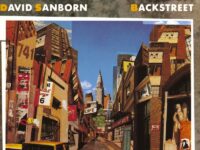As the 1970s turned into the ’80s, crossover jazz was rapidly morphing into what’s now known as “smooth” jazz. (I once heard it described as “sprout” jazz – as in, the music preferred by “those who like that kind of music also like bean sprouts on their cheeseburgers,” but that’s for another discussion.) Whatever you call it, one of the major figures in that contemporary, instrumental R&B-ish kind of music has long been David Sanborn.
Even after Kenny G and his ilk came along later and gave the whole genre a notoriety that persists to this day, I have always respected and often enjoyed Sanborn’s music. What sets him apart from the wannabes who’ve followed can be easily pinned down to a few important distinctions.
First and foremost, David Sanborn has the chops, a bellicose but deeply righteous soulful sax attack that’s perhaps the most recognizable from the first second you hear it. As the old maxim goes, he’s been plenty imitated but never replicated. He owes a lot to Cannonball Adderley, but his influences are actually more disparate than most of his fans realize. Julius Hemphill, Jackie McLean, Lou Donaldson and even Ornette Coleman are just a few sources from his deep well of inspirations.
Secondly, Sanborn usually chooses or develops his material more carefully than most, showing his penchant for quality stuff from a wide cross-section of music, whether it’s soul, reggae, gospel, etc., yet making it sound entirely his own. And finally, while there’s an undeniable sheen to his sound, that musicianship almost always shines through, anyway. (Marvel at how well Sanborn fits in, for example, on Tim Berne’s Diminutive Mysteries, a salute to Hemphill and his brand of whack jazz.)
Even though Sanborn is the consummate saxophone sideman because of his ability to apply his signature style to any setting, funky R&B-styled jazz remains his bread and butter. Which, finally, brings us “I Told U So” from 1983’s Backstreet. I can’t think of a whole lot of great contemporary jazz going on in the early 1980s as the wild improvisations and raw musicianship of the ’70s had nearly completely given way to the slick, synthed-up glossed-over production values that made it possible for players with even marginal talent to gain fame and sell a lot of records, but David Sanborn’s music only got better during this time.
Ever sensitive to modern trends in contemporary music and never pretending to be a straight jazzman in the first place, Sanborn enthusiastically went with the flow – as he’s mostly done throughout his career – on Backstreet. But this project defied the odds of becoming instantly forgettable disposable instrumental music because the production (provided primarily by bassist extraordinaire Marcus Miller) and the material were both consistently above par.
Right from the beginning, in fact. The first selection “I Told U So” is a sublime slice of sultry, mid-tempo funk. The rich, shimmering chords coming from a cascading keyboard smooths the edge provided by the robotic drums humanized by Miller’s unmistakable funk slap bass. All that creates the perfect slab of groove for Sanborn to work his magic from.
The first couple of rounds of chorus, David Sanborn plays it straight, but afterwards, improvises with his alto sax nicely with arpeggios and other expressive devices that no matter what that was he never gets ahead or behind the beat. The late, lamented Hiram Bullock, who shares co-write credit for this song with Sanborn, supplies a short but sharp blues-based guitar solo.
Contemporary live versions of “I Told U So,” as with his 1984 performance at Montreux, tend to lack the studio version’s slickness, but more than make up for it with the energy that’s on stage – particularly Bullock’s more prominent role on the song in concert. In that way, it’s as much of a tribute to his talents as it is to David Sanborn’s and the natty little tune they wrote together.
- Matthew Shipp – ‘The Cosmic Piano’ (2025) - June 17, 2025
- Ivo Perelman & Matthew Shipp String Trio – ‘Armageddon Flower’ (2025) - June 16, 2025
- Claudio Scolari Project – ‘Bloom’ (2025) - June 12, 2025




